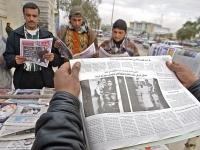BROOKE GLADSTONE: This is On the Media. I'm Brooke Gladstone with an update. Last week, President Obama signed the Homeland Security Appropriations Bill. Tucked inside was a provision related to photos depicting the abuse of military detainees in Iraq and Afghanistan, photos that the White House had agreed to make public in accordance with a court ruling last April. Last May, it reversed that decision, claiming that their release would, quote, “further inflame anti-American opinion” and put soldiers in danger. In May, Bob spoke to The New Yorker’s Jane Mayer.
BOB GARFIELD: It seems to me there are two ways to view the question of to release or not to release. One is the truth and reconciliation path, you know, that we need to come to grips with our deeds, come what may. And the other is this sort of Danish cartoons problem, that the exercise in self-criticism just doesn't justify the risk of inflaming the world and endangering our troops.
JANE MAYER: Another possibility exists too, though, that, [LAUGHS] that if you don't actually release the documents, it leaves open to the human imagination what the United States was doing. And sometimes the imagination is even worse than the reality. I mean, if, in fact, these pictures are less bad than those at Abu Ghraib, then maybe they can put to rest rumors. The other point I wanted to make, though, was that if, in fact, those photographs show crimes of some sort, then this is evidence that needs to be turned over in some way to law enforcement authorities, rather than just being deep-sixed someplace.
BROOKE GLADSTONE: The new law, signed this week, allows Secretary of Defense Robert Gates to prohibit the disclosure of any detainee photo taken between September 11th, 2001 and the beginning of the Obama administration by issuing a certificate stating that the release of the photo could endanger U.S. citizens or soldiers. Here’s ABC’s Jake Tapper questioning White House Press Secretary Robert Gibbs.
JAKE TAPPER: How is that consistent with the promise of transparency, this kind of blanket power that is now vested in the Secretary of Defense?
ROBERT GIBBS: Well, the blanket power is based on the Secretary of Defense telling the Commander in Chief that the release of these photos would threaten the safety and security of American soldiers. I doubt seriously that Secretary Gates – I know that Secretary Gates won't and I would assume that any future Secretary of Defense is not going to abuse that privilege.
BROOKE GLADSTONE: The signing of the new bill came the same week that the President agreed to disclose portions of his visitor logs in what the White House described as an unprecedented level of transparency.
